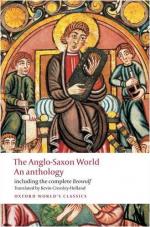|
This section contains 836 words (approx. 3 pages at 400 words per page) |

|
The Anglo-Saxon World: An Anthology Summary & Study Guide Description
The Anglo-Saxon World: An Anthology Summary & Study Guide includes comprehensive information and analysis to help you understand the book. This study guide contains the following sections:
This detailed literature summary also contains Topics for Discussion and a Free Quiz on The Anglo-Saxon World: An Anthology by Kevin Crossley-Holland.
Beowulf, King of the Geatsappears in Epic: Beowulf
Beowulf is one of the best-known fictional characters in English literature, remaining well-known throughout the ages. Beowulf is the ultimate Germanic hero, with his loyalty and respect toward the king, his unstinting bravery, and his immense fortitude and strength. He could be compared to Superman. Beowulf has superhuman strength and the ability to hold his breath for an entire day. A brash young man, he brags about his prowess in battle, as a matter of personal honor, and he is willing to go to great lengths to back up his boasts. Beowulf is capable of wielding weapons forged by giants, and he is not afraid to fight monsters, even when he knows that he is likely to die. Not only that, but he insists on fighting them with no help from others, and he prefers to do it barehanded. Later in his life, Beowulf becomes King of the Geats, and he is loved by his people as a kind, loving, and wise ruler. He puts the protection of his people before his own safety, and decides to fight the dragon, although he is a very old man by this point. Beowulf is not afraid of death, but feels that it is important that he die honorably like a warrior. When Beowulf slays the dragon, he also receives a fatal bite to the neck. He asks to look upon the dragon's treasure, since that is the cause of the fight.
King Alfred of Englandappears in The Anglo-Saxon Chronicle, Exploration, Example and Exhortat
Alfred is one of England's most beloved kings. He is the youngest of three sons, but from an early age, demonstrates that he is the most noble, handsome, kind, and intelligent of his brothers. Although he cannot not read until he is twelve years old, Alfred loves learning from an early age, and continues studying, translating, and writing throughout his life, even when he has kingly duties. As king, he works to reform education in England, encouraging schools to teach Latin to children of commoners, and translating Latin texts into English, so that people can use them. In the process, Alfred has to create a system for writing such prose in the vernacular English, because up to that point it has primarily been a spoken language, only written down for poetry or business notations. Before he becomes king, Alfred serves and fights alongside his brother King Ethelred. The two agree to take care of each other's children in the future. Alfred fights valiantly, and it is apparent that he and Ethelred are not competitive about the throne or about the wealth associated with it. Alfred staunchly defends the kingdom against Viking invaders and is a devout Christian, championing the cause of the Church. Alfred has two sons and three daughters.
Ohthere of Norwayappears in Exploration, Beowulf
Ohthere is a man of Norway, who decides that he wants to find out what lies to the north. He describes encounters with the people there and how they hunt walrus and whales.
Hrothgar, King of the Danesappears in Beowulf
Hrothgar is the king of the Danes, and lives in a wonderful hall called Heorot. Hrothgar has trouble keeping his retainers when Grendel is ravaging the countryside.
Grendelappears in Beowulf
Grendel is a hideous monster, descended from the Biblical character Cain. Grendel kills and eats many people, before Beowulf tears off his arm.
Caedmonappears in The Kingdom of God, Christian Poems
Caedmon is a humble and shy cowherd, who is inspired one night by a vision, and wakes up reciting a beautiful poem. He is one of the first to apply the Germanic poetry style to Christian ideas.
St. Cuthbertappears in The Kingdom of God, Greetings in Christ
Cuthbert is the patron saint of Northumbria. He is revered as a very holy monk, and miraculously heals people before and after his death.
Bishop Wulframappears in Sermon
Bishop Wulfram is the Archbishop of York, and writes many sermons, criticizing the sinful activities he sees around him. His pen name is "The Wolf."
Bedeappears in The Kingdom of God, Christian Poems
Bede, like Alfred, is both a character and an author of this anthology. Bede is a monk who writes many biblical commentaries, as well as lovely poems throughout his life. He spends most of his life in a monastery.
Grendel's Motherappears in Beowulf
Grendel's mother is a hideous monster like Grendel, and when she sees what Beowulf has done to her son, she shows up to get revenge. Beowulf has to follow her to her underwater home, which is guarded by sea-monsters.
Saint Edmundappears in Example and Exhortation
King Edmund is faced with a choice of paying off the Viking invaders or dying along with his people. Edmund chooses to die like a Christian martyr, calling on the name of Christ as his body is filled with arrows. After he is beheaded, a wolf miraculously watches over his head until his followers can find it and bury it with his body.
Read more from the Study Guide
|
This section contains 836 words (approx. 3 pages at 400 words per page) |

|




